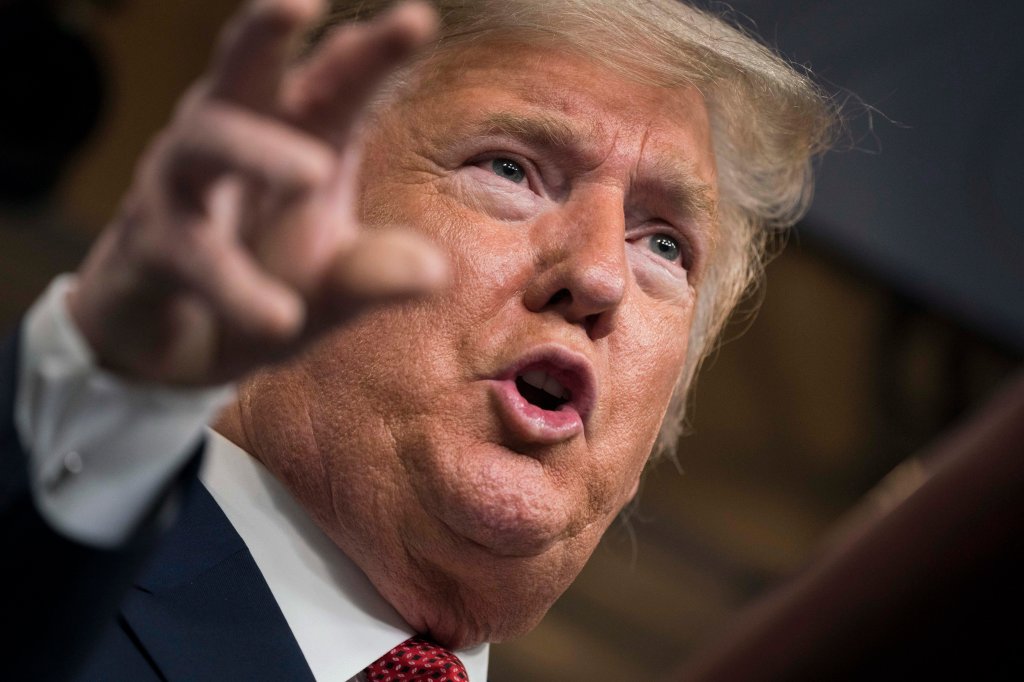U.S. President Donald Trump wants to place military troops along the U.S.-Canada border to monitor irregular border crossings amid COVID-19 fears.
Prime Minister Justin Trudeau confirmed that he and Trump are discussing the U.S.-Canada border, adding that it is one of the longest non-militarized borders in the world and “it is in both of our interests” to maintain that.
Videos by VICE
Trudeau made the comment on Thursday after Global News first reported that Trump was looking to militarize the border.
Deputy Prime Minister Chrystia Freeland offered stronger words, adding that Canada is “very directly and very forcefully expressing the view” that military presence on the border is “an entirely unnecessary step.”
Freeland said she first learned that Trump is considering deploying troops “a couple of days ago.”
Trump also said he wants to reopen U.S. borders by Easter, despite contrary advice from public health officials. The U.S.-Canada border has been closed to all non-essential travellers since last week, including asylum-seekers at irregular border crossings.
The prime minister said talks will continue with American authorities to ensure appropriate and coordinated border measures are taken as the COVID-19 unfolds. But he said all decisions will be taken with the safety of Canadians in mind.
On Thursday, Canada had about 3,500 confirmed COVID-19 cases, whereas the United States has about 68,000. New York City, which is in a state that borders Canada, has more than 25,000 cases alone.
Police will enforce Canada’s Quarantine Act
The federal government invoked the Quarantine Act at midnight on Wednesday night, making every traveller returning to Canada legally obligated to stay at home for two weeks.
Under the act, travellers who choose to “willfully or recklessly” disobey the order could face steep fines of up to $1 million and up to three years of jail time, or both, “if they cause “risk of imminent death or seriously bodily harm to another person.”
Prime Minister Trudeau did not offer details about enforcement, but said police will be checking in on travellers who are supposed to be in quarantine.
Freeland noted earlier that Canadians crossing the border into the country will be flagged, and their contact information will be recorded.
Essential workers are excluded from the order and will be allowed to return to work as soon as they arrive in Canada, Freeland said.
The announcement follows several reports of Canadians who returned home from abroad and chose not to self-isolate for two weeks—the incubation period of the novel coronavirus (COVID-19).
According to public health officials, self-isolation requires people to stay at home at all times, avoid inviting others into the house, and to keep at least 2 metres distance from others if living in a shared space.
Canada’s Minister of Health, Patty Hajdu, said people who have just returned to Canada are not allowed to use public transportation and should not self-isolate alongside people who are vulnerable to serious COVID-19 cases, such as the elderly.
Government officials have consistently urged recent travellers to quarantine but Wednesday’s announcement turned the recommendation into a legal obligation.
Canada to offer low-interest credit
Trudeau said his cabinet is working with Canada’s banks to secure cheaper credit for Canadians who need money—now.
He said Finance Minister Bill Morneau is in talks with banks about lowering interest rates of credit cards.
On Wednesday, parliament passed legislation that will give people affected by the virus $2,000 per month for four month, but payments won’t show up until at least mid-April.
Community transmission on the rise
Travel no longer accounts for the vast majority of new COVID-19 cases, several reports found.
Community transmission, cases of the virus that have either been contracted locally or have no known source, has ramped up. As of Monday, 44 percent of all Canadian cases contracted right here at home.
As cases continue to climb, Canada’s top medical official, Dr. Theresa Tam, has shifted the way Canadians should refer to precautionary measures. Namely, social distancing.
Tam said she will now refer to distancing measures as “physical distancing,” and encouraged Canadians to continue to socialize virtually.
Known cases in Canada near 3,500
As of Thursday morning, Canada had nearly 3,500 confirmed or probable cases of COVID-19, with 35 recorded deaths. In B.C. nine long-term care homes have been linked to outbreaks resulting in 14 deaths—the most in the country. Every province as well as the Yukon and Northwest Territories are affected and in a state of emergency. Nunavut, which restricted movement in and out of its borders on Monday, is the only region in Canada without a reported COVID-19 case. Here is the breakdown of confirmed or probable COVID-19 cases across Canada:
British Columbia: 662
Alberta: 419
Saskatchewan: 86
Manitoba: 36
Ontario: 858
Quebec: 1,629
Newfoundland and Labrador: 67
New Brunswick: 26
Nova Scotia: 73
Prince Edward Island: 5
Yukon: 3
Northwest Territories: 1
Nunavut: 0
Tam said a second wave of COVID-19 is possible in the country, when a new case of the virus is diagnosed after a sustained period of time with no new recorded infections.
There are more than 470,000 known COVID-19 cases globally, with more than 18,000 deaths.
Follow Anya Zoledziowski on Twitter.




